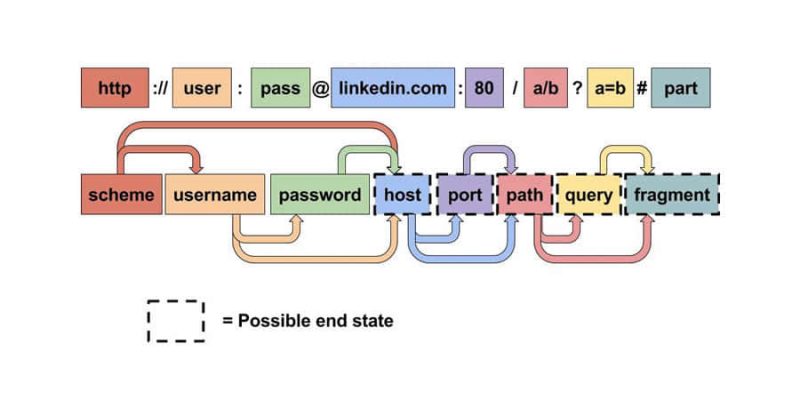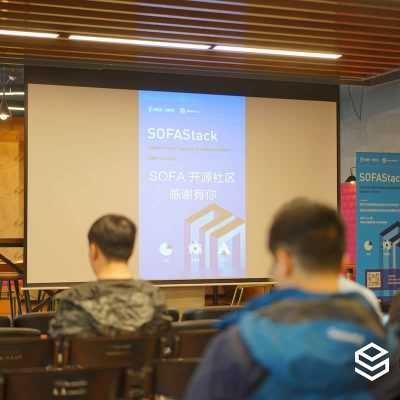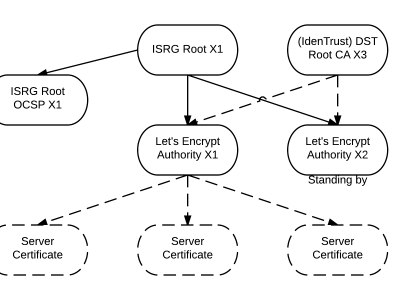使用 Python 的 urllib.parse 庫解析 URL

Python 中的 urllib.parse 模塊提供了很多解析和組建 URL 的函數。
解析url
urlparse() 函數可以將 URL 解析成 ParseResult 對象。對象中包含了六個元素,分別為:
- 協議(scheme)
- 域名(netloc)
- 路徑(path)
- 路徑參數(params)
- 查詢參數(query)
- 片段(fragment)
from urllib.parse import urlparse
url='http://user:pwd@domain:80/path;params?query=queryarg#fragment'
parsed_result=urlparse(url)
print('parsed_result 包含了',len(parsed_result),'個元素')
print(parsed_result)結果為:
parsed_result 包含了 6 個元素
ParseResult(scheme='http', netloc='user:pwd@domain:80', path='/path', params='params', query='query=queryarg', fragment='fragment')
ParseResult 繼承於 namedtuple,因此可以同時通過索引和命名屬性來獲取 URL 中各部分的值。
為了方便起見, ParseResult 還提供了 username、 password、 hostname、 port 對 netloc 進一步進行拆分。
print('scheme :', parsed_result.scheme)
print('netloc :', parsed_result.netloc)
print('path :', parsed_result.path)
print('params :', parsed_result.params)
print('query :', parsed_result.query)
print('fragment:', parsed_result.fragment)
print('username:', parsed_result.username)
print('password:', parsed_result.password)
print('hostname:', parsed_result.hostname)
print('port :', parsed_result.port)結果為:
scheme : http
netloc : user:pwd@domain:80
path : /path
params : params
query : query=queryarg
fragment: fragment
username: user
password: pwd
hostname: domain
port : 80
除了 urlparse() 之外,還有一個類似的 urlsplit() 函數也能對 URL 進行拆分,所不同的是, urlsplit() 並不會把 路徑參數(params) 從 路徑(path) 中分離出來。
當 URL 中路徑部分包含多個參數時,使用 urlparse() 解析是有問題的:
url='http://user:pwd@domain:80/path1;params1/path2;params2?query=queryarg#fragment'
parsed_result=urlparse(url)
print(parsed_result)
print('parsed.path :', parsed_result.path)
print('parsed.params :', parsed_result.params)結果為:
ParseResult(scheme='http', netloc='user:pwd@domain:80', path='/path1;params1/path2', params='params2', query='query=queryarg', fragment='fragment')
parsed.path : /path1;params1/path2
parsed.params : params2
這時可以使用 urlsplit() 來解析:
from urllib.parse import urlsplit
split_result=urlsplit(url)
print(split_result)
print('split.path :', split_result.path)
# SplitResult 沒有 params 屬性結果為:
SplitResult(scheme='http', netloc='user:pwd@domain:80', path='/path1;params1/path2;params2', query='query=queryarg', fragment='fragment')
split.path : /path1;params1/path2;params2
若只是要將 URL 後的 fragment 標識拆分出來,可以使用 urldefrag() 函數:
from urllib.parse import urldefrag
url = 'http://user:pwd@domain:80/path1;params1/path2;params2?query=queryarg#fragment'
d = urldefrag(url)
print(d)
print('url :', d.url)
print('fragment:', d.fragment)結果為:
DefragResult(url='http://user:pwd@domain:80/path1;params1/path2;params2?query=queryarg', fragment='fragment')
url : http://user:pwd@domain:80/path1;params1/path2;params2?query=queryarg
fragment: fragment
組建URL
ParsedResult 對象和 SplitResult 對象都有一個 geturl() 方法,可以返回一個完整的 URL 字元串。
print(parsed_result.geturl())
print(split_result.geturl())結果為:
http://user:pwd@domain:80/path1;params1/path2;params2?query=queryarg#fragment
http://user:pwd@domain:80/path1;params1/path2;params2?query=queryarg#fragment
但是 geturl() 只在 ParsedResult 和 SplitResult 對象中有,若想將一個普通的元組組成 URL,則需要使用 urlunparse() 函數:
from urllib.parse import urlunparse
url_compos = ('http', 'user:pwd@domain:80', '/path1;params1/path2', 'params2', 'query=queryarg', 'fragment')
print(urlunparse(url_compos))結果為:
http://user:pwd@domain:80/path1;params1/path2;params2?query=queryarg#fragment
相對路徑轉換絕對路徑
除此之外,urllib.parse 還提供了一個 urljoin() 函數,來將相對路徑轉換成絕對路徑的 URL。
from urllib.parse import urljoin
print(urljoin('http://www.example.com/path/file.html', 'anotherfile.html'))
print(urljoin('http://www.example.com/path/', 'anotherfile.html'))
print(urljoin('http://www.example.com/path/file.html', '../anotherfile.html'))
print(urljoin('http://www.example.com/path/file.html', '/anotherfile.html'))結果為:
http://www.example.com/path/anotherfile.html
http://www.example.com/path/anotherfile.html
http://www.example.com/anotherfile.html
http://www.example.com/anotherfile.html
查詢參數的構造和解析
使用 urlencode() 函數可以將一個 dict 轉換成合法的查詢參數:
from urllib.parse import urlencode
query_args = {
'name': 'dark sun',
'country': '中國'
}
query_args = urlencode(query_args)
print(query_args)結果為:
name=dark+sun&country=%E4%B8%AD%E5%9B%BD
可以看到特殊字元也被正確地轉義了。
相對的,可以使用 parse_qs() 來將查詢參數解析成 dict。
from urllib.parse import parse_qs
print(parse_qs(query_args))結果為:
{'name': ['dark sun'], 'country': ['中國']}
如果只是希望對特殊字元進行轉義,那麼可以使用 quote 或 quote_plus 函數,其中 quote_plus 比 quote 更激進一些,會把 :、/ 一類的符號也給轉義了。
from urllib.parse import quote, quote_plus, urlencode
url = 'http://localhost:1080/~hello!/'
print('urlencode :', urlencode({'url': url}))
print('quote :', quote(url))
print('quote_plus:', quote_plus(url))結果為:
urlencode : url=http%3A%2F%2Flocalhost%3A1080%2F%7Ehello%21%2F
quote : http%3A//localhost%3A1080/%7Ehello%21/
quote_plus: http%3A%2F%2Flocalhost%3A1080%2F%7Ehello%21%2F
可以看到 urlencode 中應該是調用 quote_plus 來進行轉義的。
逆向操作則使用 unquote 或 unquote_plus 函數:
from urllib.parse import unquote, unquote_plus
encoded_url = 'http%3A%2F%2Flocalhost%3A1080%2F%7Ehello%21%2F'
print(unquote(encoded_url))
print(unquote_plus(encoded_url))結果為:
http://localhost:1080/~hello!/
http://localhost:1080/~hello!/
你會發現 unquote 函數居然能正確地將 quote_plus 的結果轉換回來。
本文轉載來自 Linux 中國: https://github.com/Linux-CN/archive






















